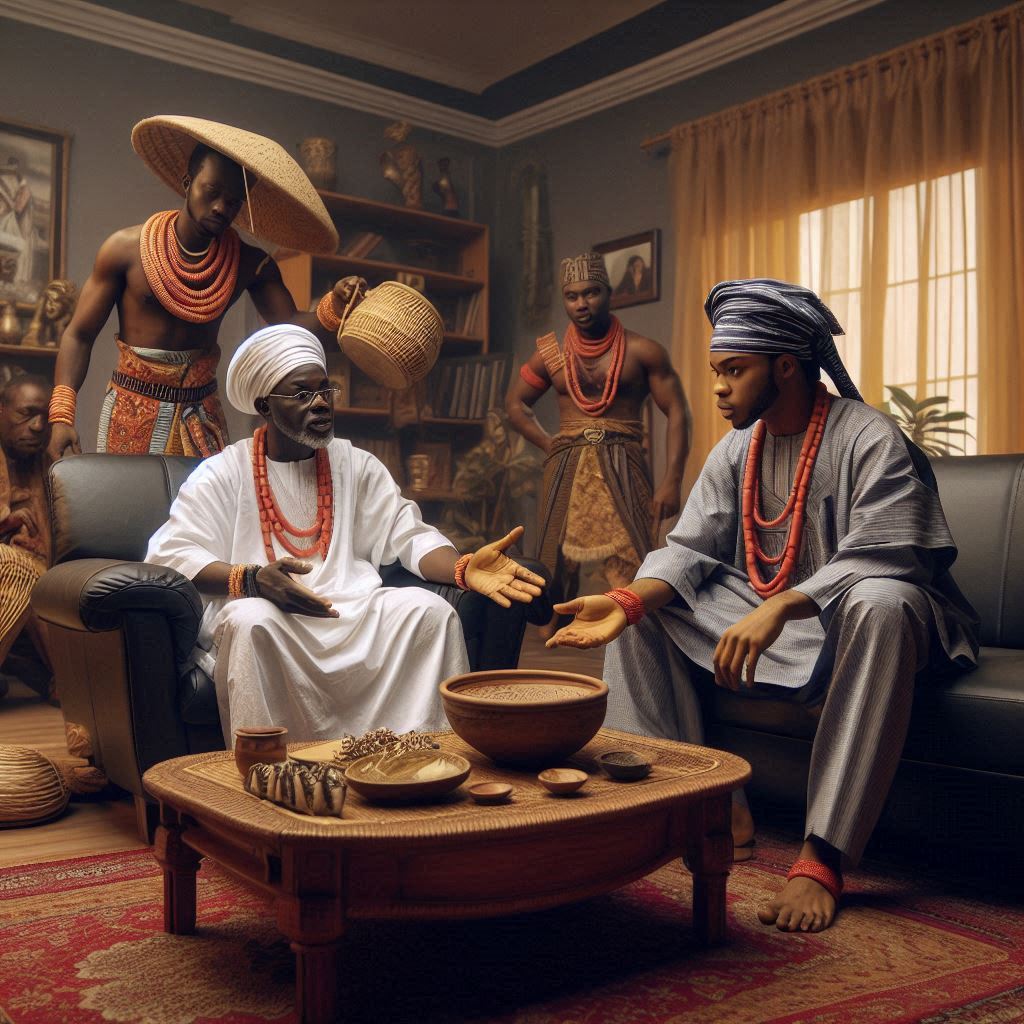Introduction
Religious and cultural studies play a crucial role in shaping the societal norms, values, and beliefs in Nigeria.
It helps preserve the rich heritage and traditions of the diverse Nigerian cultures.
The job market for religious and cultural studies in Nigeria is growing rapidly, with a high demand for professionals in academia, research, non-profit organizations, and cultural institutions.
Graduates with expertise in religious and cultural studies can find job opportunities as researchers, educators, cultural consultants, museum curators, heritage managers, and community development officers.
The field offers a wide range of career paths that allow individuals to make a meaningful impact on society by promoting interfaith harmony, preserving cultural heritage, and fostering social cohesion.
Importance of Religious and Cultural Studies in Nigeria
Religious and cultural studies play a crucial role in Nigeria. These fields explore the rich tapestry of Nigerian traditions, beliefs, and practices. Understanding these aspects is essential for fostering mutual respect and cultural integration.
Promoting Intercultural Understanding
- Cultural Awareness: These studies enhance awareness of Nigeria’s diverse cultural and religious landscape.
- Conflict Resolution: Knowledge in these fields helps mediate and resolve religious and cultural conflicts.
- Social Cohesion: They promote social cohesion by fostering mutual respect and understanding.
Preserving Heritage
- Documenting Traditions: Religious and cultural studies document and preserve Nigeria’s heritage.
- Strengthening Identity: They reinforce individual and collective cultural identities.
- Educational Value: These studies provide invaluable insights into historical and contemporary cultural dynamics.
Job Market in Religious and Cultural Studies
The job market for religious and cultural studies graduates in Nigeria is diverse and expanding. Professionals in this field can pursue careers in academia, community development, and the private sector.
Academic Careers
- Teaching: Graduates can teach at universities, colleges, and secondary schools.
- Research: Many work as researchers, exploring various aspects of Nigerian culture and religion.
- Publications: Scholars often publish their findings in academic journals and books.
Community Development
- Non-Governmental Organizations (NGOs): Many NGOs seek experts in cultural and religious studies for community projects.
- Cultural Preservation: Professionals work on projects aimed at preserving and promoting cultural heritage.
- Interfaith Dialogue: They facilitate interfaith dialogues and initiatives to promote peace and understanding.
Government and Policy
- Cultural Affairs Departments: Graduates work in government agencies focused on cultural affairs and heritage.
- Policy Development: They help develop policies that promote cultural preservation and religious tolerance.
- Advisory Roles: Professionals often serve as advisors on cultural and religious matters.
Private Sector Opportunities
- Media and Publishing: Graduates find roles in media houses, publishing companies, and cultural magazines.
- Tourism: They work in the tourism industry, promoting Nigeria’s cultural and religious heritage.
- Corporate Social Responsibility: Many businesses hire cultural experts to guide their social responsibility initiatives.
Religious and cultural studies are vital for understanding Nigeria’s rich and diverse heritage. Graduates in this field have a broad range of career opportunities in academia, community development, government, and the private sector.
By promoting intercultural understanding and preserving heritage, these professionals contribute significantly to Nigeria’s social cohesion and cultural richness.
The job market is diverse and growing, offering numerous paths for those passionate about religious and cultural studies. This field not only enriches individuals’ knowledge but also plays a crucial role in building a more inclusive and understanding society.
Overview of Religious and Cultural Studies
Difference between religious and cultural studies
Religious studies focus on the study of different religions, beliefs, practices, and traditions.
Cultural studies, on the other hand, analyze patterns of human behavior, societal norms, and cultural expressions.
Relevance of both fields in Nigerian society
Religious studies are crucial in Nigeria due to its diverse religious landscape, including Christianity, Islam, and traditional beliefs.
Understanding different faiths fosters religious tolerance and peaceful coexistence.
Cultural studies help preserve and promote Nigerian cultural heritage, traditions, and values, contributing to national identity and unity.
Impact of globalization on these disciplines
Globalization has led to the proliferation of different religions and cultures in Nigeria through increased interactions and interconnections with the global community.
This phenomenon has created a dynamic environment for religious and cultural studies, as scholars and researchers explore the influence of globalization on traditional beliefs, practices, and cultural expressions.
Globalization has also sparked debates on modernity versus tradition, challenging established norms and beliefs in Nigerian society.
Overall, the fields of religious and cultural studies play a vital role in shaping Nigerian society, fostering understanding, tolerance, and appreciation of diverse religious and cultural practices while navigating the complexities of globalization.
Read: The Future of Sociology Education in Nigeria
Job Prospects in Religious Studies
After completing a degree in Religious Studies in Nigeria, graduates have a variety of roles available to them in different sectors.
The demand for professionals in this field has been increasing over the years, providing numerous career paths within religious studies.
Types of Roles Available
- Religious Education Teacher: Teach at schools or universities.
- Religious Researcher: Conduct research on various religious topics.
- Interfaith Coordinator: Promote dialogue between different religious groups.
- Chaplain: Provide spiritual support in hospitals, prisons, or the military.
- Nonprofit Organization Worker: Work for organizations focused on religious and cultural issues.
Demand for Professionals
- Religious Studies graduates are in demand in educational institutions across the country.
- Government agencies often seek professionals to advise on religious matters.
- Nonprofit organizations require individuals with knowledge of religious studies to carry out their missions effectively.
- Media houses and publishing companies may hire religious studies graduates as consultants or writers.
Career Paths within Religious Studies
- Academic Researcher: Focus on studying and publishing research in the field of religion.
- Religious Counselor: Provide counseling services based on religious principles.
- Religious Program Coordinator: Develop and implement programs for religious organizations.
- Community Outreach Coordinator: Work with communities to address religious and cultural issues.
- Religious Historian: Specialize in the history of religions and their impact on society.
Overall, pursuing a career in Religious Studies in Nigeria offers a diverse range of opportunities for individuals passionate about understanding and promoting religious diversity and cultural understanding.
As the field continues to grow and evolve, professionals in Religious Studies will play a vital role in bridging gaps between different faiths and contributing to a more harmonious society.
Read: Exploring Nigerian Storytelling Through Film
Job Prospects in Cultural Studies
Job Opportunities for Cultural Studies Graduates in Nigeria
Graduates in Cultural Studies in Nigeria have a wide range of job opportunities available to them. Some of the most common career paths include:
- Cultural Policy Analyst
- Community Outreach Coordinator
- Marketing Specialist for Cultural Events
- Cultural Resource Manager
- Curator in Museums or Art Galleries
- Heritage Site Manager
- Event Planner for Cultural Festivals
Relevance of Cultural Studies in Various Industries
Cultural studies play a crucial role in various industries in Nigeria. Understanding different cultures and traditions is essential for businesses and organizations to:
- Develop effective marketing strategies that resonate with diverse audiences
- Ensure respectful and culturally sensitive communication with stakeholders
- Enhance employee engagement and collaboration in multicultural work environments
- Preserve and promote local heritage and traditions through sustainable practices
- Build strong relationships with international partners and customers
Skills Required for Success in Cultural Studies Careers
To excel in cultural studies careers in Nigeria, individuals need to possess a diverse set of skills, including:
- Strong research and analytical abilities to study and interpret cultural phenomena
- Excellent communication skills to engage with various stakeholders effectively
- Interpersonal skills to navigate cross-cultural interactions and collaborations
- Project management skills to coordinate cultural events and initiatives efficiently
- Adaptability and flexibility to work in dynamic and multicultural environments
- Creativity and innovation to develop engaging cultural programs and initiatives
- Critical thinking to assess the impact of cultural policies and practices
By acquiring these skills and gaining relevant work experience, cultural studies graduates in Nigeria can pursue rewarding careers that contribute to promoting cultural diversity and understanding in society.
Read: Notable Nigerian Researchers in Cultural Studies

Challenges in the Job Market
Obstacles faced by individuals seeking employment in religious and cultural studies
Lack of job opportunities in the field
The religious and cultural studies job market in Nigeria faces numerous challenges that hinder individuals from securing gainful employment in the field.
One major obstacle is the scarcity of job opportunities in the sector.
Due to the limited number of organizations that focus on religious and cultural studies, there are only a few vacancies available at any given time, making it challenging for job seekers to find suitable positions.
Low salaries compared to other professions
Additionally, those who manage to secure employment in religious and cultural studies often face low salaries compared to other professions.
The lack of financial incentives in the field discourages many talented individuals from pursuing a career in religious and cultural studies, leading to a shortage of skilled professionals in the sector.
High competition among job seekers
Furthermore, the high level of competition among job seekers adds to the challenges in the job market.
With a large number of qualified candidates vying for a limited number of positions, securing a job in religious and cultural studies becomes increasingly difficult.
Employers have their pick of candidates, making it tough for individuals to stand out and land a job in the field.
Potential solutions to address these challenges
- Diversifying job opportunities by creating more organizations that focus on religious and cultural studies
- Increasing salaries to attract and retain talented professionals in the field
- Providing career development opportunities to help individuals advance in their careers
In general, addressing the challenges in the religious and cultural studies job market in Nigeria requires a multi-faceted approach.
By expanding job opportunities, improving salary structures, and offering career development opportunities, the sector can attract and retain skilled professionals, ultimately enhancing the quality of research and education in religious and cultural studies.
Transform Your Career with Expert Guidance
Get personalized mentorship consulting that’s tailored to your unique path. Our expert advice is actionable and exclusive.
Get StartedRead: Evolution of Religious Studies Discipline in Nigeria
Advantages of Pursuing Careers in Religious and Cultural Studies
Benefits of working in these fields
In the realm of Religious and Cultural Studies in Nigeria, the advantages of working within these fields are manifold.
Individuals engaged in these professions often find themselves immersed in rich cultural tapestries, exploring the depths of human belief systems and societal structures.
They become custodians of history, preserving and disseminating traditions that are the cornerstone of Nigerian identity.
Moreover, careers in Religious and Cultural Studies offer a unique opportunity for personal and intellectual enrichment.
Professionals constantly engage with diverse perspectives, challenging their own assumptions and expanding their worldview.
This constant intellectual stimulation fosters personal growth and a deeper understanding of the world around them.
Opportunities for personal and professional growth
Beyond personal enrichment, careers in Religious and Cultural Studies also provide ample opportunities for professional growth.
Individuals in these fields often find themselves at the forefront of interdisciplinary research, collaborating with scholars from various disciplines to unravel the complexities of human existence.
This interdisciplinary approach not only enhances their academic credentials but also opens doors to diverse career paths, ranging from academia to cultural preservation and beyond.
Furthermore, professionals in these fields often have the privilege of engaging directly with communities, fostering meaningful connections and making tangible impacts on people’s lives.
Whether through education, advocacy, or community outreach, they have the opportunity to effect positive change and contribute to the betterment of society.
Potential for making a positive impact on society through these careers
Perhaps the most rewarding aspect of pursuing a career in Religious and Cultural Studies in Nigeria is the potential for making a positive impact on society.
As stewards of cultural heritage, professionals in these fields play a crucial role in preserving and promoting Nigeria’s rich cultural diversity.
By fostering interfaith dialogue, promoting cultural exchange, and advocating for social justice, they contribute to building a more inclusive and harmonious society.
Moreover, professionals in Religious and Cultural Studies often serve as mediators in times of conflict, bridging divides and fostering understanding between different communities.
Their work helps to promote peace and reconciliation, laying the groundwork for a more cohesive and resilient society.
In summary, careers in Religious and Cultural Studies offer not only intellectual stimulation and professional growth but also the opportunity to make a meaningful and lasting impact on society.
As Nigeria continues to navigate the complexities of modernity while preserving its cultural heritage, the role of these professionals becomes increasingly vital in shaping a brighter future for generations to come.
Education and Training Requirements
Academic qualifications and certifications needed for jobs in religious and cultural studies
To pursue a career in religious and cultural studies in Nigeria, individuals need at least a Bachelor’s degree in related fields such as Religious Studies, Anthropology, Sociology, or Cultural Studies.
Some positions may require a Master’s or Ph.D. for advanced research or teaching roles.
Importance of continuous learning and professional development
Continuous learning is crucial in this field due to the dynamic nature of society and culture, necessitating staying updated with current trends and developments.
Professional development through attending workshops, conferences, and seminars helps professionals enhance their knowledge and skills.
Role of internships and practical experience in securing employment in these fields
Internships and practical experience are invaluable in gaining real-world exposure and building a professional network in religious and cultural studies.
Practical experience could involve working with religious organizations, cultural institutions, museums, or academic research projects.
Securing internships and volunteer opportunities during academic studies can open doors to employment opportunities after graduation.
Developing strong research, critical thinking, and analytical skills is essential for success in religious and cultural studies careers.
Proficiency in relevant software and technology tools used in research and analysis is also beneficial for job seekers.
Networking within the academic and professional community can help individuals learn about job opportunities and establish connections in the field.
Engaging in collaborative projects and research with colleagues can broaden one’s knowledge base and enhance their professional reputation.
You Might Also Like: Nigerian Diaspora: Maintaining Native and European Languages
Conclusion
The religious and cultural studies job market in Nigeria is vast and diverse. It offers numerous opportunities for individuals with a passion for these fields.
These studies are significant in understanding and preserving the rich cultural heritage of Nigeria.
They play a crucial role in promoting unity and tolerance among different religious and cultural groups.
I encourage individuals interested in religious and cultural studies to pursue their passion and explore the various career opportunities available in Nigeria.
By doing so, they can make a meaningful impact on society and contribute to the progress and development of the nation.
Key Points Summary
- Religious and cultural studies in Nigeria explore the rich traditions, beliefs, and practices.
- These fields promote intercultural understanding, conflict resolution, and social cohesion.
- Job opportunities exist in academia, community development, government, and the private sector.
Significance of Religious and Cultural Studies
Religious and cultural studies are crucial for understanding Nigeria’s diverse heritage. They help preserve traditions and promote mutual respect and understanding. Professionals in this field contribute significantly to social cohesion and cultural richness.
Encouragement to Pursue Careers
- Follow Your Passion: Pursue religious and cultural studies if you have a passion for understanding and preserving heritage.
- Explore Opportunities: Numerous career paths exist in teaching, research, community projects, and the private sector.
- Make an Impact: Your work can promote intercultural understanding and social cohesion in Nigeria.
Embrace these fields to make a meaningful difference in Nigerian society.




